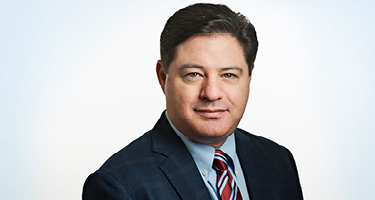Laurie Webb Daniel thrives when the stakes are high—both in and out of the courtroom.
A revered leader in the appellate landscape, she has decades of experience representing Fortune 500 and other renowned companies with the goal of mitigating nuclear verdicts. Her advocacy and legal knowledge have overturned judgments, enabling clients to save hundreds of millions of dollars and maintain their reputations. But her practice is not solely on the defense side. In the right kind of business dispute, she has recovered millions for injured parties.
In 2022, she concluded a 28-year chapter by leaving Holland & Knight LLP, where she was head of the firmwide Appellate Team. Along with former firm associate Matt Friedlander, she launched Webb Daniel Friedlander, a national boutique based in Atlanta, Georgia, which is already making waves in the appellate arena.
Best Lawyers recently sat down with Laurie Webb Daniel, who has been recognized annually in The Best Lawyers in America® since 2003 in Commercial Litigation and 2007 in Appellate Law and named “Lawyer of the Year” for Appellate Law, Atlanta (2017), to discuss how she strategizes against high-powered opponents in high-profile cases.
Laurie, you are certainly recognizable among the legal community. How would you characterize your practice now?
I am a generalist with an appellate specialty. My forte is combining appellate skills with substantive expertise to position high-stakes cases for a successful outcome, often collaborating with trial counsel from other firms. Though we primarily work on the defense side, we also have represented plaintiffs and have recovered sizeable monetary and other remediation through business litigation.
In sum, we are a resource for motions, appeals and strategic trial support in federal and state courts nationwide, including the U.S. Supreme Court. Our cases range from complex business litigation to torts involving catastrophic injuries—such as product liability, premises liability and wrongful death.
When considering the scope of practice areas, little has changed since leaving BigLaw and launching Webb Daniel Friedlander.
What inspired you to form your own boutique?
I always felt fortunate to be a Holland & Knight partner, and I now am proud to be an H&K alum. But over time, I realized I was operating an appellate boutique within a large firm. Dealing with the uncertainty of the last few years provided me with a special confidence in launching my own firm. And since I’ve always had a harmonious relationship with Matt Friedlander, partnering up was the natural next step.
We formed our firm to serve a niche practice and be a trusted advisor to clients facing substantial risk in cases that are likely to be resolved on appeal. I think our successful move reflects a growing acceptance of appellate advocacy as a specialty practice and one where a firm like ours can thrive.
What are the advantages of launching your own firm?
One of the advantages we have is dropping the overhead that burdens a full-service law firm. For example, we don’t need large conference rooms for depositions because we do not handle depositions. And we are free of bureaucracy and other administrative costs. Best of all, we can attract top talent by offering them the freedom to do what they love and excel in—analyzing complex issues, writing, arguing points of law to judges and doing it for the joy of the practice and not a billable hours quota.
Also, we all are truly dedicated to client service, whether it is a corporate client or a pro bono engagement. In our firm, we have much more flexibility in setting the parameters for the working relationships with clients. And I love being able to adopt a culture that is attractive to both our clients and our lawyers who serve them—a balanced culture that is rewarding to all of us, both monetarily and also satisfying personal and professional expectations.
Your clients are typically well-funded entities themselves, which is why they are defending against such high-value claims, or perhaps pursuing claims against other well-heeled businesses. When do you connect with a client?
It all depends on the circumstance. Sometimes we’re contacted after a nuclear verdict hits. Those are challenging engagements because we have to jump into the fire without knowing the background. A fresh view can bring new angles to the case, but we often have to deal with waiver issues when we do that. So it’s always good to come into a case earlier.
Often, we work with trial counsel at other firms or in-house counsel to develop legal strategies before or during trial. Typically, this makes a seamless trial team, resulting in a smooth and efficient transition into the appellate arena.
One of your key goals is to mitigate or ward off nuclear verdicts, which can start from $10 million, but we’re seeing many more in the range of hundreds of millions. What is driving these high-value awards?
My home state of Georgia has climbed to the top of the “hell hole” list. Why is that? I believe there are contributing factors, such as the lawyer advertising that followed on the heels of the U.S. Supreme Court’s first amendment rulings and possibly a related shift in expectations for recoveries.
I think, though, that the more pertinent question is what to do to ward off runaway verdicts—or, if you represent a plaintiff, how to obtain a supportable judgment that is not just an eye-popping result that may not hold up on appeal. We have a commendable batting average for reversals—wins way above the odds—that confirms the wisdom of taking the long view on how to successfully resolve a high-stakes case.
Earlier, you mentioned setting the course for the firm. How has Webb Daniel Friedlander made an impact in its first year?
We have had some big wins on the defense side, but again, we are not always on the defense. For example, we recently secured a reversal of an adverse ruling for a government contractor—the plaintiff—against Boeing, with reinstatement of a $100 million trade secrets claim.
We also recently won a huge victory in the Georgia Supreme Court, defeating a challenge to Georgia’s cap on punitive damages, which limits those damages to $250,000, except in rare circumstances. The plaintiff challenged the cap under the Georgia Constitution—and the Eighteenth Century English Common Law it adopted—but we convinced the Court that the plaintiff’s argument was flawed.
On the other hand, we successfully overcame the punitive damages cap in a business case just a few weeks later when we collaborated with trial counsel to show that our client—a plaintiff—had satisfied one of the exceptions and could be legitimately awarded uncapped punitive damages.
What are some favorite parts about leading your own firm?
There is a special joy in creating a business model that accommodates women in a much better way than when I started practicing law. It’s so gratifying to lend a hand to those who follow me. Also, regardless of the personal identity of the lawyers who work with me—or are opposite me—there is nothing like the camaraderie that comes with a small firm practice. Partnering with other firms can be so rewarding. And thanks to the years of doing so, we have gained the confidence of the other firms we work with and our mutual clients—plus the respect of our opponents. We just love what we do and look forward to doing it more in the years to come.
Contact Laurie Webb Daniel today at 404.433.6430, laurie.daniel@webbdaniel.law, or through LinkedIn at https://www.linkedin.com/in/laurie-webb-daniel-47080311/.




























